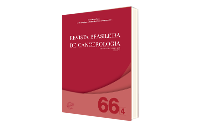Palliative Extubation in Terminal Patients: Integrative Review
DOI:
https://doi.org/10.32635/2176-9745.RBC.2020v66n4.1098Keywords:
Airway Extubation, Hospice Care/methods, Medical Futility, Terminally IIIAbstract
Introduction: Palliative care aims to minimize the suffering of both patients and their families through a multidisciplinary work. Non-communicable chronic diseases are the leading cause of suffering and disability, leading them to palliative care. In order to alleviate suffering, palliative extubation is a procedure that avoids prolonging death by removing invasive respiratory measures such as orotracheal intubation. Objective: To perform an integrative review and analyze/present the impact of palliative extubation in terminal patients. Method: A literature review study through search performed in the databases PEDro, LILACS and PubMed, using the keywords: airway extubation, palliative care and hospice care. Results: For this study, 41 articles were found, being 15 relevant for the review. Studies have shown that palliative extubation is beneficial for patients and their families, even though the time of death may vary according to the existing disease. Conclusion: Despite the small number of studies, it was possible to observe that palliative extubation proved to be effective in the treatment based in family members reports, ensuring better quality of life and a more peaceful death without further suffering.









